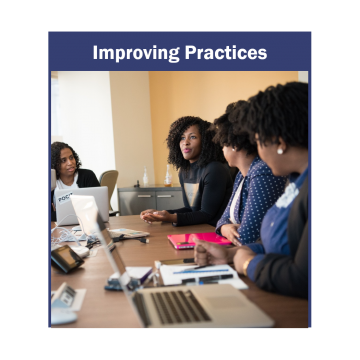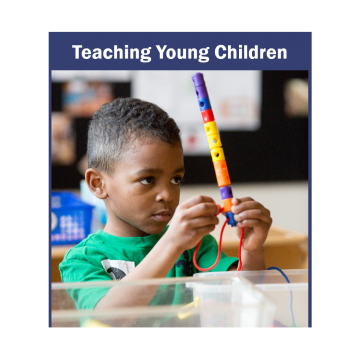As a professional in Missouri’s Early Care & Education (ECE) system, you play an essential role in preparing young children for school. You promote positive early learning experiences and ensure smooth transitions within and between programs. You continue to improve your practice through research and professional development to use best practices with children and families.
Click above to view tips for improving your practice, supporting families, and teaching young children.
Resources
- Brain Development
-
Healthy development in the early years provides the building blocks for educational achievement, economic productivity, responsible citizenship, lifelong health, strong communities, and successful parenting of the next generation. This three-part video series from the Center and the National Scientific Council on the Developing Child depicts how advances in neuroscience, molecular biology, and genomics now give us a much better understanding of how early experiences are built into our bodies and brains, for better or for worse.
Learn more about the Three Core Concepts in Brain Development
The science of early brain development can inform investments in early childhood. This brief is part of a series that summarizes essential scientific findings from Center on the Developing Child publications. These basic concepts, established over decades of neuroscience and behavioral research, help illustrate why child development—particularly from birth to five years—is a foundation for a prosperous and sustainable society.
Learn more about the Science of Early Development
Over the last decade, news reports, policy statements, and commercial marketing have all contributed to the public’s understanding of early brain growth. While the most significant advances in brain architecture occur prenatally, brain development is life long. This NIEER policy brief summarizes what is known about early neurobiological development.
Learn more about Brain Development and its Implications
The Traumatic Brain Injury (TBI) Early Childhood Toolkit is provided as a resource to educate professionals and parents about traumatic brain injuries (TBI). This toolkit evolved through collaborations among the Missouri Department of Health and Senior Services, Missouri Head Start Association, Head Start State Collaboration Office and the University of Missouri-Columbia Thompson Center for Autism and Neurodevelopmental Disorders Department of Health Psychology. This toolkit was reviewed and recommendations were collected from a workgroup of Head Start and Parents as Teachers staff. It contains Educator Resources and Parent Handouts.
- Trauma Informed Care
-
The National Child Traumatic Stress Network (NCTSN) was created by Congress in 2000 as part of the Children’s Health Act to raise the standard of care and increase access to services for children and families who experience or witness traumatic events. This unique network of frontline providers, family members, researchers, and national partners is committed to changing the course of children’s lives by improving their care and moving scientific gains quickly into practice across the U.S.
Learn more about the National Traumatic Stress Network
Trauma Smart was developed by the experts at Crittenton Children’s Center. Trauma Smart was founded on evidence-based interventions recognized by the U.S. Department of Health and Human Services and the National Child Traumatic Stress Network to be effective in helping children and the adults who care for them address the negative impact of violence and trauma.
This issue brief provides basic information on brain development and the effects of abuse and neglect on that development. The information is designed to help professionals understand the emotional, mental, and behavioral impact of early abuse and neglect in children who come to the attention of the child welfare system.
Learn more about the Effects of Maltreatment on Brain Development
Stress can trigger hormones that wreak havoc on the brains and bodies of children, putting them at a greater risk for disease, homelessness, prison time, and early death. While the broader impacts of poverty worsen the risk, no segment of society is immune. Pediatric doctors, education leaders, and social workers are working together to find ways to combat the effects of toxic stress and help secure happier and healthier futures for children.
Learn more about Prevent Child Abuse America: The RESILIENCE Project
To help traumatized children, we need to understand how the brain responds to threat, how it stores traumatic memories and how it is altered by the traumatic experience. Yes, altered. All experience changes the brain – good experiences like piano lessons and bad experiences like living through a tornado as it destroys your home. This is so because the brain is designed to change in response to patterned, repetitive stimulation. And the stimulation associated with fear and trauma changes the brain.
Learn more about How Childhood Trauma Influences Brain Development
What happens in early childhood can matter for a lifetime. To successfully manage our society’s future, we must recognize problems and address them before they get worse. In early childhood, research on the biology of stress shows how major adversity, such as extreme poverty, abuse, or neglect can weaken developing brain architecture and permanently set the body’s stress response system on high alert. Science also shows that providing stable, responsive, nurturing relationships in the earliest years of life can prevent or even reverse the damaging effects of early life stress, with lifelong benefits for learning, behavior, and health.
Learn more about the Impact of Early Adversity on Children’s Development
This working paper from the National Scientific Council on the Developing Child defines the concept of “toxic stress”—what happens when children experience severe, prolonged adversity without adult support. It discusses how significant adversity early in life can alter a child’s capacity to learn and adapt to stressful situations, as well as how sensitive and responsive caregiving can buffer the effects of such stress.
The paper also suggests how to create policies that minimize the disruptive impacts of toxic stress on young children. Some suggestions include making affordable expert assistance more available to caregivers who may not have sufficient knowledge and skills to help young children exhibiting symptoms of toxic stress, and aiding existing intervention programs to better address the effects of toxic stress by incorporating training and expertise in the identification of young children with serious, stress-related, mental health problems.
Learn more about How Excessive Stress Disrupts the Developing Brain
- Social Emotional Development
-
ECE professionals play an important role in nurturing children’s social and emotional development. Supporting children’s social and emotional development can be both rewarding and challenging. Critical to providing support is having realistic expectations of children’s development at different ages. Realistic expectations of when infants are able to experience emotions, how easy or difficult it is for a toddler to take turns and when young children are able to follow simple directions can bring greater success and less frustration for young children and professionals.
Learn more about Fostering Healthy Social & Emotional Development in Young Children



